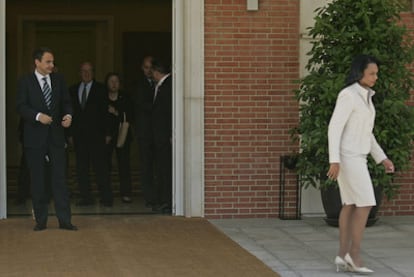Release of confidential Wikileaks cables draws US ire
Socialists say they are not concerned about Wikileaks revelations
The US Embassy in Madrid on Monday said it "regretted" and "condemned" the leak of a batch of secret US government cables by the whistle-blowing website Wikileaks, details of which EL PA?S is publishing over a number of days.
In a statement posted on the Embassy's website, press counselor Thomas Genton said that US government was concerned that releasing the documents "poses real risks to real people, and often to particular people who have dedicated their lives to protecting others."
Among the 251,000 cables seen by EL PA?S, and other news outlets in Europe and the United States, 3,620 deal with high-level talks between Embassy officials — including three US ambassadors — and officials from the Spanish government, judiciary, and business sector.
Several of the summaries in the cables include descriptions and reactions to secret meetings held to complain about the current Socialist government's policies and the High Court investigations targeting US officials for crimes related to the Iraq war.
Health Minister Leire Paj¨ªn said Monday that measures should be taken so that there are no more leaks of diplomatic cables, and said that the international diplomacy should be "at the service of people and not other interests.
"I would like to think that they are going to take the necessary measures so that these things don't occur," she said.
While saying he couldn't vouch for the authenticity of the cables, the US Embassy's press counselor Thomas Genton said Monday that the United States "deeply regrets" and "condemns" the disclosure of information intended to be confidential.
"Diplomats must engage in frank discussions with their colleagues, and they must be assured that these discussions will remain private," he said. "Honest dialogue — within governments and between them — is part of the basic bargain of international relations; we couldn't maintain peace, security, and international stability without it."
Marcelino Iglesias, Socialist Party secretary, said his organization is not in the least bit worried about the papers, which illustrate the tremendous pressure that has been placed on the Jos¨¦ Luis Rodr¨ªguez Zapatero government by the three US ambassadors who have served in the country between 2004 and 2010.
Among the messages concerning Spanish affairs, 103 are secret and 898 are confidential. Besides focusing on Zapatero, they also deal with meetings with, and details of, PP leader Mariano Rajoy, and former prime ministers Jos¨¦ Mar¨ªa Aznar and Felipe Gonz¨¢lez.
A lot of the cables are revealing and contain the personal views of US diplomats — sometimes not at all flattering — about Spanish officials.
In one cable, the United States Embassy explains to Washington that Zapatero's election win in 2004 was due to the "poor handling" of the Madrid train bombings by the previous PP government. Then-Prime Minister Jos¨¦ Mar¨ªa Aznar and his Cabinet insisted at the time that Basque separatist group ETA was to blame for the terrorist attacks that left 191 people death and more than 2,000 wounded on March 11, 2004 — just three days before general elections. Islamist terrorists were later found to be behind the atrocities.
Using phrases such as "outdated" and "romantic leftist" to describe Zapatero, the diplomats had sent cables to their peers in Washington describing the incoming prime minister while speculating on his political intentions. In one cable sent to then-US Secretary Condoleezza Rice, Ambassador Aguirre says that Zapatero plays up to his "leftist and pacifist electorate base" and uses his foreign policy objectives to "win points" in Spanish politics.
Cayo Lara, federal coordinator for the United Left (IU) party, accused the US government of "acting like Big Brother" across the globe.
"If Zapatero is outdated — I don't know how many more descriptions they gave him — then [Gaspar] Llamazares or any of the other leftists in Spain must be terrifying to the Americans," Layo said.
In the cables, US Embassy officials also cautioned Washington about Zapatero's relations with Latin America and the possible withdrawal of Spanish troops from Iraq, an announcement he made after he took office. After that decision, relations between Washington and Madrid soured to a point that President Bush didn't take Zapatero's phone of congratulations when the US leader won reelection later that year.
US Embassy press secretary Genton said that the diplomats' internal cables do not represent the government's official foreign policy. "In the United States government, they are but one element out of many that shape our policies, which are ultimately set by the president and the secretary of State," he said. "US diplomats around the world meet with local human rights workers, journalists, religious leaders and others outside of government who offer their own candid insights."
But the cables do offer some unflattering portrayals. With the exception of King Juan Carlos, the US diplomats appear unenthusiastic about many officials. One cablegram gives US diplomats pointers on how to get on the king's good side.
The cables also describe the reprimands made by the US ambassadors — including the incumbent Alan D. Solomont — to many Spanish leaders.
Wikileaks has begun posting some of the cables on its own whistle-blowing website.

Tu suscripci¨®n se est¨¢ usando en otro dispositivo
?Quieres a?adir otro usuario a tu suscripci¨®n?
Si contin¨²as leyendo en este dispositivo, no se podr¨¢ leer en el otro.
FlechaTu suscripci¨®n se est¨¢ usando en otro dispositivo y solo puedes acceder a EL PA?S desde un dispositivo a la vez.
Si quieres compartir tu cuenta, cambia tu suscripci¨®n a la modalidad Premium, as¨ª podr¨¢s a?adir otro usuario. Cada uno acceder¨¢ con su propia cuenta de email, lo que os permitir¨¢ personalizar vuestra experiencia en EL PA?S.
En el caso de no saber qui¨¦n est¨¢ usando tu cuenta, te recomendamos cambiar tu contrase?a aqu¨ª.
Si decides continuar compartiendo tu cuenta, este mensaje se mostrar¨¢ en tu dispositivo y en el de la otra persona que est¨¢ usando tu cuenta de forma indefinida, afectando a tu experiencia de lectura. Puedes consultar aqu¨ª los t¨¦rminos y condiciones de la suscripci¨®n digital.
































































